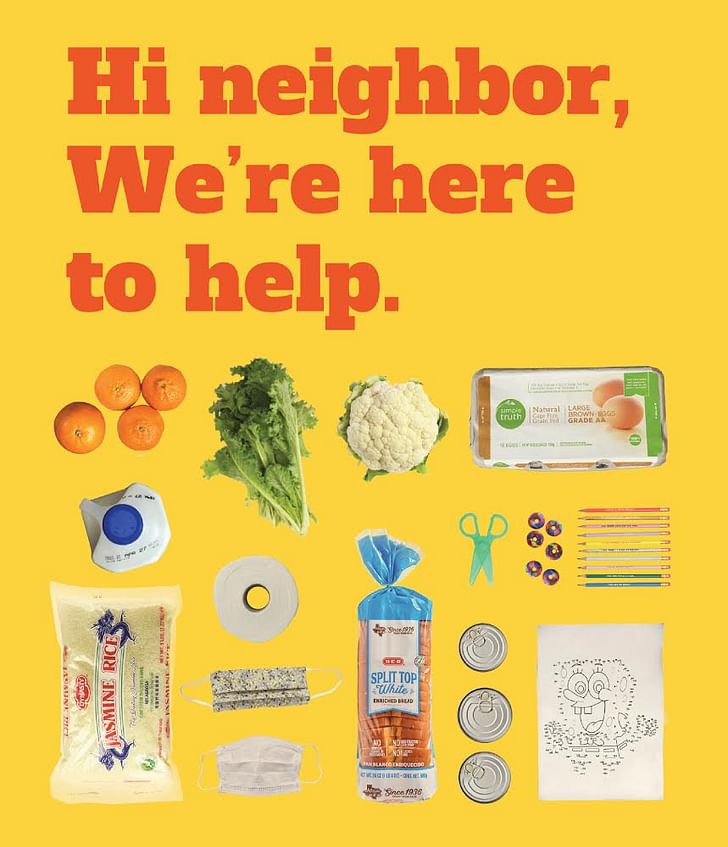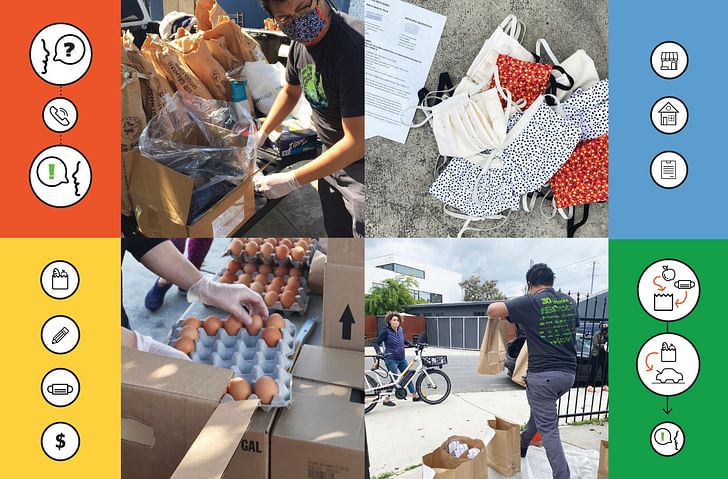

As traditional architecture and design firms struggle to cope with the social and economic fall out of the COVID-19 crisis, Los Angeles-based urban design nonprofit LA-Más has been able to put their project management, design, and community engagement skills to work by coordinating the delivery of material and economic aid to communities that are under siege by the pandemic.
The organization’s Northeast LA Community Response initiative was created as the pandemic took hold and has quickly grown in scale and focus over the resulting weeks. Emerging from an ongoing effort to redouble the group’s regional equity and spatial justice focus toward the Frogtown / Elysian Park neighborhood of Northeast Los Angeles where LA-Más is headquartered, the aid program also serves as a model for an innovative application of architectural project management strategies.
According to the LA-Más website, the Community Response project brings local residents weekly deliveries of free vital daily necessities, including boxed groceries, face masks, family activity kits, and direct cash support.
A lot of the work we were doing was with people who are already operating under tight margins, so we asked ourselves ‘How can we focus our resources to benefit the most vulnerable folks who live here? Lower income residents, undocumented immigrants, seniors—How can we support them?’”
Pooling together contact information from existing community groups and other public sources, Elizabeth Timme and Helen Leung, Co-Executive Directors of LA-Más, and their cross-disciplinary team got to work doing what they often do over the course of their day-to-day work: Coordinating between different stakeholder groups and organizations to deliver materials and services in targeted ways to the benefit of their clients. Except now, in the aftermath of COVID-19, instead of undertaking the multi-faceted community-focused design and improvement projects LA-Más typically executes—including developing Accessory Dwelling Units (ADUs) in residential backyards and designing, sourcing, and executing no-cost facade improvements for existing local businesses—the team is bringing direct social and economic aid to neighborhood residents. "In the past, we have used design and policy as the drivers of our work but in this case, we are putting residents' needs as the drivers and using our skills to help deliver services,” Leung explains.

“When COVID-19 hit, we had been having conversations with neighbors and other nonprofit leaders on what would it would mean for LA-Más to privot to a more community-development and community-led model,” Timme tells Archinect.
Alex Ramirez, Program Manager LA-Más explains, “A lot of the work we were doing was with people who are already operating under tight margins, so we asked ourselves ‘How can we focus our resources to benefit the most vulnerable folks who live here? Lower income residents, undocumented immigrants, seniors—How can we support them?’”
In the past, we have used design and policy as the drivers of our work but in this case, we are putting residents' needs as the drivers and using our skills to help deliver services
Although Northeast LA communities have been among some of the most heavily gentrified districts in the city, many working class residents still call the area home. This has meant that while residents in wealthier areas have perhaps been able to continue working from home, Frogtown, which has a high number of residents who struggle to make ends meet even in good times, is home to many who are wholly unable to work due to the city’s shelter-in-place directives.
In response, LA-Más began coordinating a network of neighborhood volunteers to execute food drop offs, protective mask manufacturing, and direct aid efforts to help keep these residents afloat and informed during the crisis.
The team, for example, helps to share information for filing unemployment claims, distributes rent and mortgage news, and even offers individualized help—like how to sign up for social services like free senior meals or by providing family activity kits for homebound schoolchildren and isolated seniors—depending on each resident’s particular circumstance. Partnering entirely with local entities that include a Community-Supported Agriculture (CSA) non-profit API Forward Movement, restaurant-turned-grocer Lemon Poppy Kitchen, the community culinary facility AMPED Kitchens, and a long list of other providers, LA-Más has been able to bring necessary supplies to over 100 neighborhood families over two weeks. Leung, who was raised in Frogtown by working class immigrant parents noted, “We’re especially proud of the collaborative spirit of this effort which was inspired by our neighbors—David De La Torre from the Elysian Valley Neighborhood Watch and Ceci Dominguez from the Elysian Valley Senior Club—who we are partnering with to ensure how we respond starts with those who are the most vulnerable.”

And while the team was initially able to create a thorough list of contacts for the neighborhood, it was clear from the onset that many hard-to-reach residents, some of whom are elderly immigrants who may or may not speak English, were in danger of being left behind. To help, the designers created a series of posters to communicate what they can provide and how to sign up. Inspired by the Point-It guide and IKEA’s FIKA cookbook that displays recipe ingredients in discrete, colorful arrangements, the designers crafted eye-catching posters highlighting loaves of bread, vegetables, kids’ activity packs, and all the other things that might be available to those who need them.
The poster and other collateral materials, according to Timme, are the beginning of a “suite of capacity-building content that will include information on public health, renter’s rights, how to access resources, along with ‘how to’ guides - as we distribute these goods.”
“Language should not be a barrier in a time of crisis,” Timme explains before adding that the poster design is an intentional choice to embed educational content within a “language-less guide to communicate information without words.” The poster and other collateral materials, according to Timme, are the beginning of a “suite of capacity-building content that will include information on public health, renter’s rights, how to access resources, along with ‘how to’ guides - as we distribute these goods.”
Throughout, as Ramirez explains, the team used their “project management skills to scale things up and manage what has become a complex system.” Ramirez adds, “Within a week we went from testing the idea to starting to make phone calls to delivering aid.”
To fully operate the project, the LA-Más team relies on a growing network of over a dozen volunteers who are each trained by the group to deliver aid and collect information about neighborhood needs. Weekly training sessions for new volunteers take place remotely on Tuesdays and Thursdays while a Friday team check-in ensures that everyone is prepped and ready for weekend drop-offs.
“We decided early on in this project we were not going to be an issue-specific organization,” Timme adds, explaining that this approach put the delivery of everything from food to tenant information and masks on the table, to the benefit of the effort. “We’ve pivoted to meet the small and big needs of people experiencing the brunt of the blow with COVID-19 through an adaptable, direct aid system that allows people operating from places of privilege to support others who are housing-unstable, job-unstable, or otherwise particularly hard hit by the crisis.” Timme posits, outlining the goals of the project.
Because LA-Más operates as a nonprofit, the group had existing connections with a constellation of private and community bank partners and other support groups like the Annenberg Foundation, WHH Foundation, Chan Zuckerberg Initiative, local LA City Council Districts, the Nonprofit Finance Fund, and others, all of which have contributed funding and resources toward the initiative. These groups allowed LA-Más to repurpose previously allocated funding or provided new grants and other resources toward the Northeast LA Community Response initiative to get the project off the ground. As a result, the office has not had to resort to layoffs or furloughs among its staff and has actually been able to reorient and redefine its mission in a targeted and community-responsive manner.
As Timme explains, the project focuses on collaborative, comprehensive community aid, “Not just supporting the families that are in crisis, but also supporting local businesses that are struggling to survive, creating a form of co-mutual, co-beneficial support for Northeast Los Angeles.”
Antonio is a Los Angeles-based writer, designer, and preservationist. He completed the M.Arch I and Master of Preservation Studies programs at Tulane University in 2014, and earned a Bachelor of Arts in Architecture from Washington University in St. Louis in 2010. Antonio has written extensively ...
No Comments
Block this user
Are you sure you want to block this user and hide all related comments throughout the site?
Archinect
This is your first comment on Archinect. Your comment will be visible once approved.